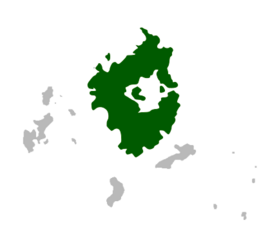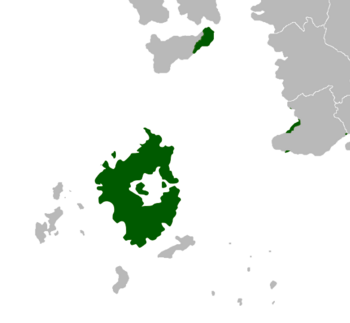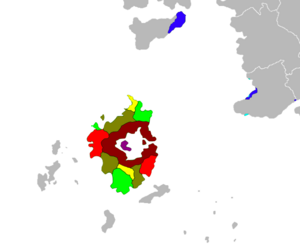Kingdom of Alstin
This article is a work-in-progress because it is incomplete and pending further input from an author. Note: The contents of this article are not considered canonical and may be inaccurate. Please comment on this article's talk page to share your input, comments and questions. |
Kingdom of Alstin | |||||||||
|---|---|---|---|---|---|---|---|---|---|
| 1565 AD-1688 AD | |||||||||
|
Flag | |||||||||
Motto: "One Nation, United" | |||||||||
 Location of the Kingdom | |||||||||
 Alstinian overseas possessions in 1682 | |||||||||
| Capital | Alstin | ||||||||
| Official languages | Alstinian Ænglish | ||||||||
| Religion | Chantry of Alstin | ||||||||
| Demonym(s) | Alstinian | ||||||||
| Government | Federal parliamentary constitutional monarchy | ||||||||
| King of Alstin | |||||||||
• 1565-1573 | Alstanus | ||||||||
• 1573-1584 | Martin | ||||||||
• 1584-1589 | Tyrios | ||||||||
• 1589-1621 | Douglas | ||||||||
• 1621-1631 | Richard | ||||||||
• | Julius | ||||||||
• 1682-1685 | Stephan | ||||||||
• 1685-1688 | David | ||||||||
• 1688 | Geoffrey | ||||||||
| Legislature | Parliament | ||||||||
| Currency | Royal dollar | ||||||||
| |||||||||
The Kingdom of Alstin was a sovereign state encompassing what is now the Inner Islands of the Alstinian Isles from 1565, when Alstanus Ryefield was formally proclaimed as its first King, to 21 April 1688, when a Republic was proclaimed at the end of the Alstinian Civil War. The Kingdom of Alstin was among the most powerful states in Crona during the early modern period.
Initially founded a as a myriad of refugee colonies for Levantine Protestants fleeing persecution during the Great Confessional War, the settlements in and around the Altaic Sea united under the banner of Alstanus Ryefield, ruler of city of Alstin, formally establishing the Kingdom and beginning a century-long reign by the House of Ryefield. Throughout the remainder of the 16th century, the Kingdom experienced a remarkable rate of growth as Alstinian society developed and flourished as a result of its position at critical crossroads of traffic and trade routes on the Isles, while also slowly yet gradually expanding its domain in every direction across the Inner Islands; By 1600, the Kingdom had, during the reign of Douglas Corvinus, gained full control of the region.
Over the course of the subsequent eighty years, the Kingdom experienced a period of relative peace and internal stability, as the Alstinians experienced an unprecedented amount of economic growth from its position at the crossroads of sea-based trade in the Orixtal Sea. This, combined with considerable scientific advances and cultural progress, would later become known as the "Long Peace". At the same time, Alstin engaged in series of conflicts in and around the lands of the Azure Sea, the Orixtal Sea, and the Sea of St. John, from the Islevyny Archipelago to the shores of Deralveca, in an effort maintain the stability of the region.
In 1684, following a costly decade-long war with the Martillien North Levantine Trading Company (MNLC), the Kingdom of Alstion into civil war which culminated in the death of Geoffrey Ryefield on 4 July 1689, ending the House of Ryefield. Nine months later, on 21 April 1689, the United Republic of Alstin, one of the first federal republics in the history of the world, officially came into being with the ratification of the Constitution, and the unanimous election of Marcus Alanson as the first President of the United Republic.
Etymology
The nation's name derives from the city of Alstin. The city's name itself, according to its founding myth, is believed to have been derived from the city's founder and the first king of Alstin, Alstanus Ryefield.
The standard way to refer to a citizen of Alstin is as an "Alstinian."
History
Main Article: History of Alstin
Origin
It has been generally accepted that the first inhabitants of the Alstinian Isles migrated from mainland Crona and East Audonia arrived at least 3,000 years ago; however, some evidence suggests an even earlier date of arrival. Over time, indigenous cultures in Crona grew increasingly complex, and some, such as the pre-Levantine Azure culture in modern-day Azura, developed advanced agriculture, architecture, and complex societies. The city of Cuzco is the largest, most complex pre-Levantine archaeological site in Alstin, and is the oldest continuously inhabited settlement in the modern-day United Republic. In the Kjeldorian Highlands region, the Kjeld culture practiced hunting and trapping, along with limited cultivation. The Uto, located in modern-day Utopia, practiced fishing and whaling.
Occidental Settlement and the Founding of the Kingdom
Further reading: Aster's expedition, Great Confessional War
The first Levantines to arrive in Alstin were Occidental explorers connected to Paul Aster's voyage to find a western route to Audonia in March 1389. During the Age of Exploration in the early 16th century, several trading outposts were established throughout the Isles, forming the foundation of a number of modern-day Alstinian cities. However, during the Great Confessional War, waves of predominantly Protestant refugees fled from Levantia to the Alstinian Isles, founding a myriad of settlements; Many of which were established on the island of Altaica, with the biggest concentration of the settlements being in and around the Altaic Sea.
Of these settlements, the most notable was Alstin. Founded on 23 March 1559 by the Protestant Ænglish noble Alstanus Ryefield, the city, due its location on a island in the center of the Altaic Sea, quickly became the economic and cultural center of the Isles. By 1564, the city-state was recognized as one of the preeminent polities in the region, and the most powerful in the Altaic. With the Great Confessional War still ongoing, and Protestant refugees continuing to pour into Isles, the settlements in the Altaic gradually came to realize that a unified, centralized authority was needed to ensure peace and stability in the region, promote internal commerce and development, and defend against incursions from external hostile powers. After months of intense negotiations, the sixteen city-states of the Altaic agreed to unite under the Alstinian banner, forming the Kingdom of Alstin, with Alstanus Ryefield being formally coronated as its first King on 1 April, and beginning the nearly thirteen decade-long reign by the House of Ryefield.
Reign of the Founder King 1565-1573

Among the first acts Alstanus Ryefield undertook as monarch was the composition and issuance of the Omnibus Canon on 8 May 1565, a document that designated certain rights as being "God-given and inalienable" and guaranteeing such rights to "all Free Men, Ennobled and Common" under the protection of the Crown. Other acts undertaken during his early reign include...
Establishment of Parliament in 1566
Founded the Alstinian Army and Royal Navy as standing military forces
Establishment of royal trade routes and introduction of the Royal dollar as the legal currency of the Kingdom
Conquest/Annexation of modern-day Felicia, Daltonland, and parts of Cuzco and Silvia
Founded numerous cities and settlements throughout Alstinian-held Altaica
Disappered on 1 November 1573
Sons of Alstanus 1573-1589
Summary of Martin 's Reign (1573-1584)
Summary of Tyrios' Reign (1584-1589)
Slavery and Slave Trade permitted
Age of Corvinus 1589-1621

Annexation of remainder of Ionach in 1592
Conquest of Kjeldor in 1600
Start of the "Long Peace"
William Bet's expedition (1601-1610)
Founding of Sedem Regni
The Ursinus Decade 1621-1631
Wars in the Outer Islands
First "Burg-Alstinian War"
Founding of Cage Landing
The Julian Age 1631-1684
Establishment of the Colony of Mierria
The Alstinian Civil War 1684-1688
TBA
Government
TBA
Economy
TBA Southern slave trade Burgoignesc slave trade
Society and Culture
TBA
